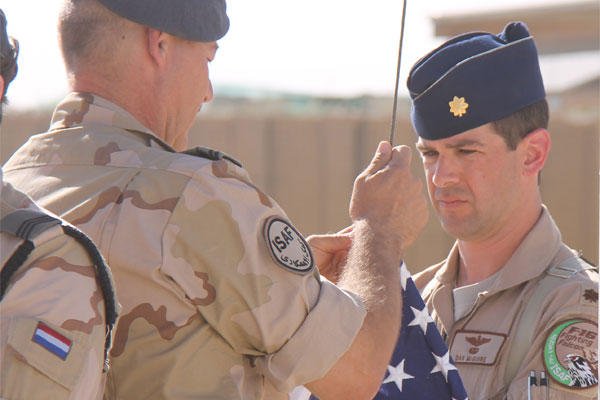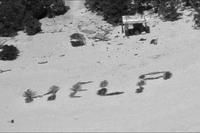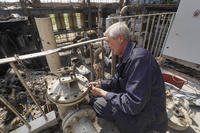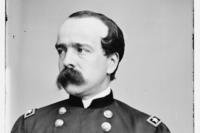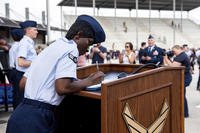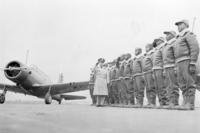VOLKEL AIR BASE, the Netherlands -- For the past two years, Maj. Dan McGuire, an F-16 pilot, and his wife, Jen, called the Netherlands home.
McGuire participated in the Air Force Personnel Exchange Program and served as an exchange pilot with the Royal Netherlands air force. He was assigned to the 312th Tactical Fighter Squadron at Volkel Air Base.
Prior to moving overseas, the couple attended an intense, six-month Dutch language course offered by the Defense Language Institute in Alexandria, Va.
"The course was fantastic and really prepared us for our assignment," McGuire said. "When we arrived in the Netherlands, we were fluent enough to negotiate our housing lease, set up our utilities, and blend into our new community."
Professionally, the language training enabled McGuire to perform day-to-day squadron operations entirely in Dutch. Although his colleagues were fluent in English, which is the official language of both NATO and the aviation community, McGuire preferred to engage with them in Dutch to practice his language skills. As a result, his command of the language was proficient enough to receive mission and flight briefings in Dutch, as well as manage squadron operations.
"During my assignment, I went from understanding an average of maybe 65 to 75 percent of what was said on a daily basis, to understanding 85 to 95 percent," he said.
"Exposure is the key. Your ear learns to listen for the right things, as you become more accustomed to the pace and rhythm of the language. And speaking-wise, I am much more comfortable. My vocabulary has improved somewhat, but it's the 'common speak' that has really come along. Knowing the lexicon, the catch phrases, and the semantics goes a long way toward getting your point across."
McGuire's fluency also gave his Dutch supervisors confidence in his ability to coordinate with higher echelons. This afforded him a unique opportunity last summer. Between June and September 2011, McGuire deployed to the Combined Air and Space Operations Center (CAOC) in Poggio Renatico, Italy, in support of Operation Unified Protector. He served as the Dutch liaison officer and senior national representative, coordinating, planning, and liaising between the Dutch Fighter Command in Holland, the Dutch F-16 expeditionary detachment in Decimomannu (Sardinia), and the planners at the CAOC.
"I worked daily with the CAOC director and deputy combined forces air component commander, and was a part of multiple innovative operations that improved the efficiency of combat operations there," McGuire said. "The hours were sometimes grueling, since as a one-man-show I had to be present for the daily planning and coordination meetings. On weeks that we flew nights, I also had to be available on the (operations) floor during our eight-hour fly-window. Overall, I learned a tremendous amount about air operations first hand. There's no substitute for real world experience!"
McGuire developed his air operations knowledge base a few years ago through a planning course at Maxwell Air Force Base, Ala., and most recently through joint planning courses offered in his Master's in Military Operational Art and Science degree through Air University's Air Command and Staff College.
For Jen, her language training was especially helpful. She grew up racing barrel horses on a ranch in Idaho and always wanted to learn the formal disciplines of dressage and show jumping. She was able to negotiate the purchase of her Dutch Warmblood horse, named Belregazzo, and take lessons from a local riding stall, all completely in Dutch.
"As opposed to the Dutch pilots, who speak near-perfect English, taking lessons from the rural horse professionals was a different story," she said. "My Dutch was much better than their English, and sometimes this was the only language they spoke."
Jen's fluency definitely paid off. During her last dressage competition she earned second place and enough points to compete at officially sanctioned events. Jen also remarked that her second language helps tremendously with her errands and shopping in the countryside, where the couple lived.
"Understanding Dutch made my day-to-day life possible, especially when Dan was deployed. It would have been incredibly frustrating without it," she said.
The assignment provided McGuire with numerous opportunities to engage with other NATO countries, fostering mutual understanding of each other's cultures and air forces.
Not long after arriving in the Netherlands, McGuire attended a NATO winter survival course, hosted by the Royal Norwegian air force, with guest help from Canadian Survival Instructors, in Spatin, Norway. He spent 10 days receiving cold-weather training and exposure alongside Danish, Dutch, and German flight crews.
"It was interesting to see the different cold-weather gear each country issues its aircrew, and then share techniques and learn new skills to use in a harsh winter environment," McGuire said. "We weaved and built our own snow shoes, built emergency snow shelters above tree-line, and navigated through some pretty intense wind-swept country and mountainous terrain."
McGuire, a highly-experienced outdoorsman who grew up in Colorado and graduated from the University of Colorado-Boulder in 2001, received the award for building the best improvised shelter.
"The first night we had to build shelters in a wooded environment with the equipment we would have had in a bail-out situation," he said. "I used my parachute together with some fallen trees and fresh boughs, and lashed down a tight shelter, since the wind was really picking up. I've weathered some cold nights in the Rocky Mountains, so my experience told me not to cut any corners. It paid off, and the instructors liked that."
For McGuire, the pinnacle of his exchange experience was deploying with the Dutch in a combat flying role in Afghanistan. This past spring, McGuire deployed to Mazar-e-Sharif, Afghanistan, with the Dutch Air Task Force, a detachment of the Royal Netherlands Defense, with members supporting F-16 operations from the airfield. They provided armed over-watch and reconnaissance for both the Dutch Police Training Group (PTG) in Kunduz, and on-call support for NATO and coalition troops in need.
"It was truly rewarding to serve alongside those guys, especially because it was my first time in Afghanistan," he said.
McGuire flew missions throughout most of Afghanistan supporting the International Security Assistance Force (ISAF) and Operation Enduring Freedom.
"We flew missions in nearly every part of the country, sometimes transiting across the entire country a couple times in one sortie," McGuire recounted. "We routinely were re-tasked hundreds of miles away from our primary tasking due to a troops-In-contact situation. My deployment made me realize that we really are all on the same team: an American, flying in a Dutch formation, talking to a Norwegian JTAC, supporting an Afghan National Army patrol. That is what coalition operations are all about."
While her husband was in Afghanistan, Jen kept herself busy furthering her studies in preparation for her return to work, completing both a refresher course in micro-biology, as well as level 1 Spanish. She also spent a week living with a family in Valencia, Spain, practicing her Spanish.
"With our next assignment in Arizona, I knew that speaking Spanish would be a huge plus for a resume and certainly in the health profession," she said. "And it really is true that learning a third language is much easier than learning your second!"
In November, the McGuire's relocated to the Arizona Air National Guard's 162nd Fighter Wing in Tucson. McGuire is training the next generation of Danish, Dutch, Japanese, Polish, Singaporean, and Iraqi F-16 pilots.
As an instructor pilot, he's responsible for training new F-16 student pilots from many of the same nations he worked with throughout his last tour. Though he may not use his language skills as often as he did in the Netherlands, McGuire said the real benefit from working so closely with partner nations in Europe was a greater cultural understanding.
"Cultural differences are often underestimated. Knowing how deep they run can pay huge dividends when connecting with foreign-servicemembers," he said. "Coalition operations are the future. I'm glad that I've been able to build the professional relationships and gain the understanding that will further our ability to facilitate those operations in the future."
